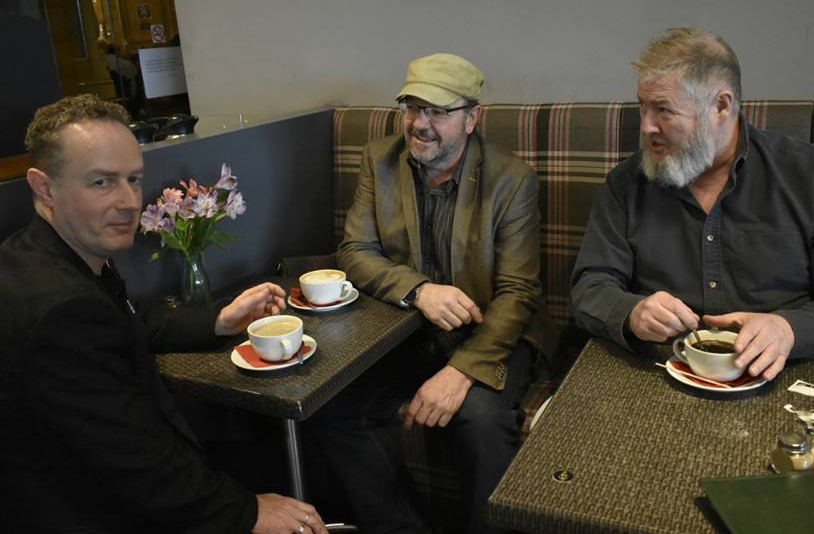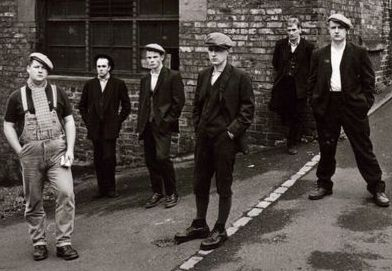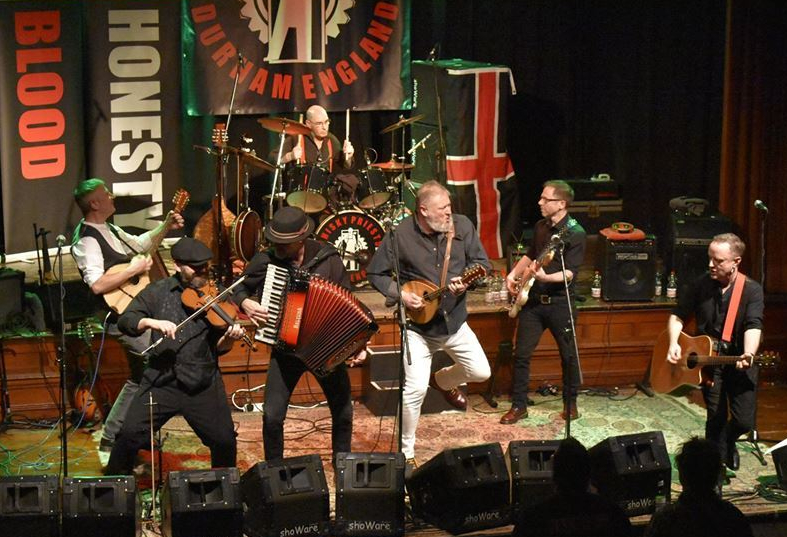
Gary Miller, Gary Alikivi & Mick Tyas.
North East folk rockers The Whisky Priests released their first album Nee Gud Luck in 1989…
Gary Nee Gud Luck was done quickly which made it quite exciting really. Later on, with other albums I found it a stressful experience because being a perfectionist it was difficult to relax in the studio. I was quite uncomfortable in that situation and once you press that button you know.
Mick Thing is, recording is very clinical and very mechanical you know, you do your bit and add the overdubs. But live you play it warts an’ all, you make mistakes, and we still play those songs.
Listening back would you change anything on that first album ?
Gary No, looking back we wouldn’t change anything about the music. It’s like looking back on old photos isn’t it. They are defining moments.
Creative people keep searching for perfection, improving on the last thing you’ve done. Always feeling you can do better and that’s how it should be you know. No, wouldn’t change anything.

Mick That cover picture was taken outside The Cluny, you can see the old cobbles, the River Tyne is behind us.
Gary There is nothing to suggest there’s a recording studio in the warehouse.
Mick We have talked about going back there and re-staging the photo with the new line up.
Gary Our image is authentic. If it was fake people would see through it and it would fall apart. At school I’d wear white shirt and crombies. When I got into music in the ’70s I was into The Clash, XTC, Post punk stuff but a band I was heavily into was The Specials.
Jerry Dammers was a genius, creating the whole black/white image, second-hand suits, and the way the band was presented with all their energy. Here was a band that looked like a gang. Myself and my brother took a lot from that.
Similar to bands like the Ramones ?
Gary Yeah, when we started, we wanted to reflect that because we didn’t do things by halves. It was 100%. On stage we were putting our heart and soul into it. It was who we were.
Mick We did a festival in Belgium and were second on the bill to the Ramones. We met them and Joey said he liked our show, but the others were kind of introvert.
I remember we were in Italy and got on the guest list for a Ramones gig. My memory of that night was being asked for my autograph at a Ramones gig not a Whisky Priests gig (laughs).
Gary We’ve always had our integrity. We’ve always tried to be honest and never be pretentious about it. Not being calculated about it or commercial, we’ve just followed our creative heart.
Mick There’s been various people trying to get their hooks in and manipulate and change us, but the integrity of the band stops that.

Founder member Gary Miller remembers how the name of the band came about…
We had been rehearsing, our first gigs were arranged, and we needed a name. My brother and I wrote down a few names and that was the best of the bunch.
It came from a character in a book The Power and the Glory by British author Graham Greene, which is set during the Mexican revolution. The main protagonist is an anonymous priest and referred to as The Whisky Priest.
Mike We called one of our albums The Power and the Glory as a homage to the author. There was no real story behind it, but it had a few advantages.
Gary Yeah, we were at a gig in Germany and halfway through a guy came on stage with a tray full of glasses of whisky for us (laughs). And once we were playing in Holland and there was an article in a newspaper warning people not to go to see this band cos apparently, we were encouraging alcoholism. As a result, the gig was a sell-out (laughs).
Mick Yeah there’s no such thing as bad publicity.
There has been a reunion lately but when were The Whisky Priests first active ?
Gary From 1985 to 2002 officially, then we kind of went into hibernation, we did a few gigs here and there but that was it until the reunion tour last year. We enjoyed it and the majority of material was from the early part of our career.
It was great to revisit it and we adapted some songs, it had a freshness because we now have 30 years of experience behind us. And not just musicality but life you know.
Mick Some of the stuff we were playing were better versions I thought. We were out there enjoying it.
Gary Yeah, we were doing it for different reasons. Back then everything rested on it, you never had time to step back and appreciate it. It was relentless. So, this time was a celebration really of the band’s history and legacy.

Multi-instrumentalist Mick Tyas joined The Whisky Priests in ’88, adding vocals, banjo, mandolin and bouzouki…
I had been on a Christmas holiday with some friends, and we were driving back when I heard an interview with the band on BBC Radio Cleveland. The band were only a three piece then and were looking for a bass player. My friend’s wife said why not ring them up, I think I remember the phone number.
At first I got the number wrong then tried again, got it right and went along to the audition. Which was at your parents’ house wasn’t it ?
Gary Yeah, in my bedroom (laughs).
In the early years the band had already created a loyal following…
Gary Yeah, we’d only played a few gigs in local pubs around Durham. Our first gig was in October ’85 and the band were just in a fledgling state, none of us were full-time then and were holding down day jobs.
We had a loyal following and one of them was called Nigel Wreford, and his dad had a dairy farm near Haswell. He used to deliver the milk and one of the houses on his route belonged to a producer at Tyne Tees Television who produced The Tube, his name was Malcolm Gerrie.
We hadn’t released any records by then, but we did have some demo tapes. On his next round the farmer dropped off the milk as usual but put a tape next to the bottles with a note attached saying…’Have a listen to this, think you might like it’.
This was early ’86 and I was working my first job as a clerical assistant in Social Services at Durham County Hall when the phone rang and my colleague shouted over… ‘Gary, it’s for you’… I thought it must have been someone ringing from one of the care homes when someone on the other end said…
‘It’s Tyne Tees Television can you come and do The Tube this Friday’. This was at five-to-five on a Wednesday afternoon (laughs).
I did meet Malcolm Gerrie later and he said he was driving in his car when he remembered the tape, listened to it and thought ‘I must get these guys on The Tube’.
We loved the experience and opportunity for what was a young band then. We were sat in the studio canteen seeing all these famous people off the telly…’I recognise him he does the news’ (laughs).

Did more opportunities come off the back of your appearance on The Tube ?
Gary Yeah, suddenly we had the chance to play outside our immediate area. We were the band off The Tube, you know. In the bar at The Tube, we met these two guys who were getting into artist management.
One was a sort of music mogul who knew about the industry and the other was purely business and knew nothing about music. It looked promising at first, they signed another act as well, but the guys fell out with each other.
So, one took one act and the other got, well we ended up with the businessman who knew nothing about the music industry.
The other guy became head of Go Disc records and signed The Housemartins, bands like that. So, it could have been a different scenario.
Our manager put our first single out which kick-started our recording career but nothing after that… he needed the other guy! Eventually we parted company and started doing it ourselves.
Was this the start of Whippet Records ?
Gary Our first recording was down the Newcastle Quayside at a place called Prism Sound that ended up on a compilation album of bands from Durham.
Then we put a single out, The Colliery on 7inch that set up Whippet Records then put out two 12inch ep’s in 1988. That’s when Mick joined and we recorded our first album Nee Gud Luck in ’89 at The Cluny recording studio, now a music venue.
Mick Yeah, originally it was an old whisky warehouse. We went down into the bowels of the place in a big service lift. The engineer was Mickey Sweeney who used to record a lot of folk acts around the North East.
It was all done in about six days, mostly recorded live including the mixing. We had a lotta fun but could have done with more time.
Gary Yeah, it was bang, bang, bang… and the brass band was in there. I was in the control room singing and to avoid any sound spillage the rest of the band where in the studio.
Mick It was very seat of yer pants recording. No cans (headphones) or soundproofing really. The engineer saying ‘I’m just nipping over to The Ship to sort sumthin’ out’ (laughs).
Gary We put it out through Celtic Music who we ended up having a big court battle with. But at their insistence we recorded it there cos it was their in-house studio. They recorded all their acts in The Cluny.
But on our subsequent albums we were looking for an alternate studio and Mick mentioned Trinity Heights run by Fred Purser (former Penetration/Tygers of Pan Tang guitarist). We went there in January ‘92 for our second album.
Mick Yes, I already knew Fred, originally from school, so the link was there, and I think we were one of the first to record in Trinity Heights. As well as producing he played on one or two of the tracks. We recorded three or four albums there.
Gary It was great because we became good friends with Fred, he’s such a laid-back guy and a good atmosphere was created to record in. No matter how disastrous it became in the studio he was always calm and collected which rubbed off on us.
When was your first magic moment listening to music, a time that stands out as really special ?
Gary That would go right back to when I was four years old and my dad was into Italian opera but he was also into military brass band music. Me and my twin brother used to listen to the records marching around the room banging toy drums and playing trumpets. That was a real buzz.
That tied in with going to the Durham Miners Meetings and seeing the brass bands, that had an influence as well because both my parents’ families were miners. It was in my blood and had a big impact.
Then at junior school we’d listen to the radio and sing these folk songs from all around the world. Songs like Jesse James, The Streets of Laredo, Casey Jones and the Maid of Amsterdam. Then local stuff like The Lambton Worm and The Blaydon Races. It opened up my mind that songs could tell stories.
Then teenage years listening to rock and pop records in my room standing in front of the mirror miming along, that’s when I decided I wanted a guitar.
Mick The first band I saw live was The Beatles, I was 8 year old. We were living in London at the time cos me father worked for the prison service.
He had bought four tickets, there was my father, mother, sister and me sitting in Hammersmith Odeon. I’ve never forgotten it cos at the time I knew it was something important.
We moved back up here (North East) in time to see England win the World Cup and I got into folk music and prog rock, bands like Fairport Convention, Steeleye Span then Led Zeppelin.
Punk came along and I had a connection with Penetration through their guitarist Fred Purser. Then I got into The Pogues, The Men They Couldn’t Hang you know that whole Folk slant.
Some musicians often talk about missed opportunities to take their music to a larger audience. Did you experience this ?
Gary We played Cambridge Folk Festival 1990. Colin Urwin, journalist on the folk scene wrote in The Gaurdian that ‘We’re going to be the next big thing’. So, there was a definite buzz.
That was our window of opportunity, but we were stuck in this contract with an independent record company. Our manager at the time, who had also managed The Strawbs, said ‘I’m going to get you signed to a major label’.
After about a year we went to his office in Tottenham Court Road and he sat us down and showed us all these letters from A&R guys at major record companies EMI, Sony, BMG, Arista loads all desperately wanting to sign us.
At the time The Pogues had been hugely successful and all these companies were looking for a band that could be part of that.
Mick There was only The Pogues, The Men They Couldn’t Hang and ourselves were the main ones that were around. The Levellers were on their way up.
Gary Yeah, but we were already in a contract with an independent label and couldn’t get out.
Mick Our manager eventually dropped us, he couldn’t invest in us anymore. The Musicians Union eventually got us out after three years in all, plus we couldn’t record during that time.
Gary By then we’d missed the boat. That was our big opportunity. We couldn’t get bookings at festivals because the company owner, who we took to court, blackened our name.
Mick Yeah it was… ‘Don’t book the Whisky Priests, they’re trouble.’ For every up, there’s half a dozen downs. You think ‘yeah there’s something happening here’… then you just don’t get the break.
Gary Ironic thing was that if we had done something with a major label he would have been in for a percentage.
There was a label from France interested and we were top of their list. But with everything happening they went with the second band on their list, The Levellers – look what happened to them. It’s all if’s, but’s and maybes. But we still soldiered on with our career just not on a major label.
After the success of the reunion tour last year the band are busy booking European dates for this year…
Mick Well you’re never too old to rock n roll and I enjoy it now much more than I ever did. I’ve been a musician all my life and getting up and doing it is still the most thrilling thing you can do.
To play in front of an audience and get a reaction is great, especially in this band.
We were playing a concert by Skype last week to two guys and it was as thrilling as getting up at a festival in front of 20,000 people. Still great, still got a buzz. This reunion has been great because once you’ve done it you just want more. It’s yer lifeblood.
Gary For me music has always been in my blood. I’m a songwriter, I create my own music and will always be doing it. I’ve always had my own vision and been driven.
When we weren’t performing as a band in the intervening years, I was a Community Artist, held song writing workshops, worked as a music agent and tutor. Always maintaining a link with the music industry because that’s where I felt I belong. That’s where my heart is.
Interview by Gary Alikivi March 2019.
For more info contact The Whisky Priests on the official website
https://www.whiskypriests.com/
Recommended:
Interview with Fred Purser 30th Dec 2018.





